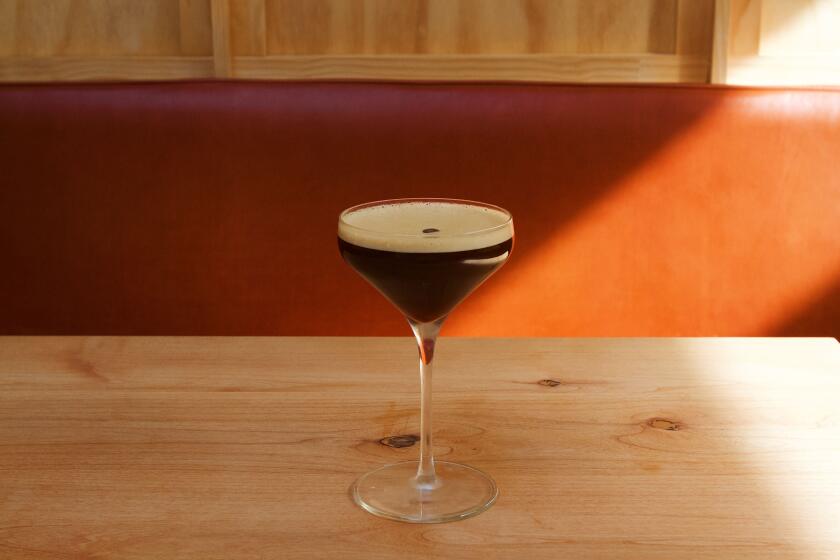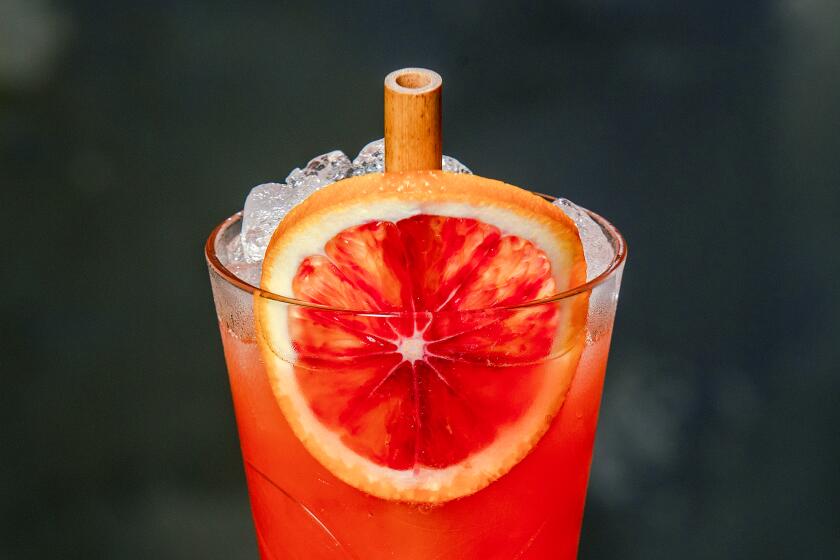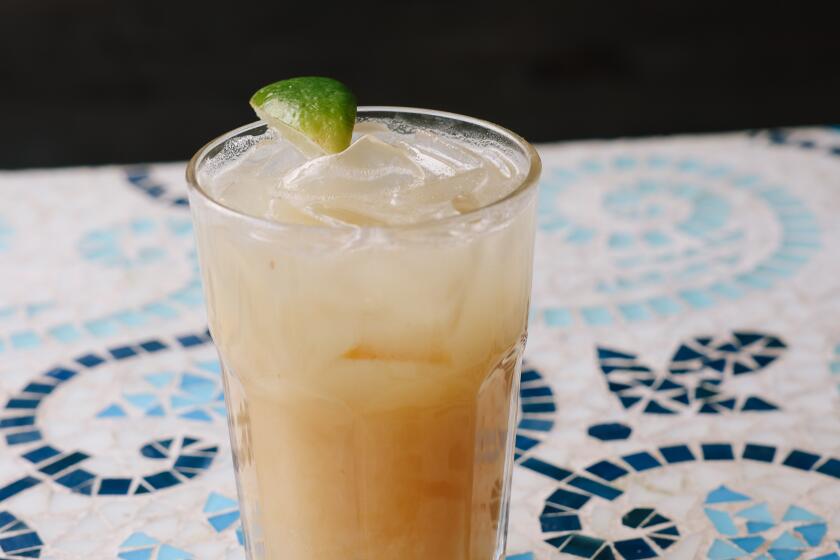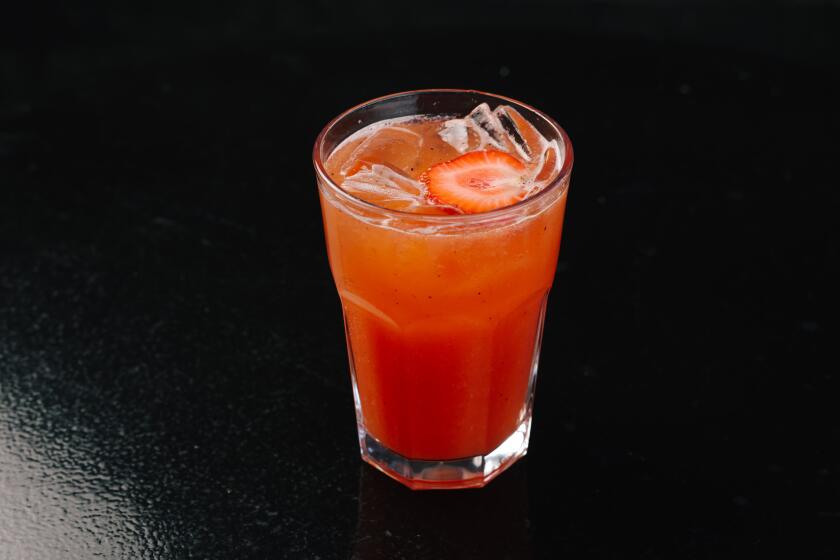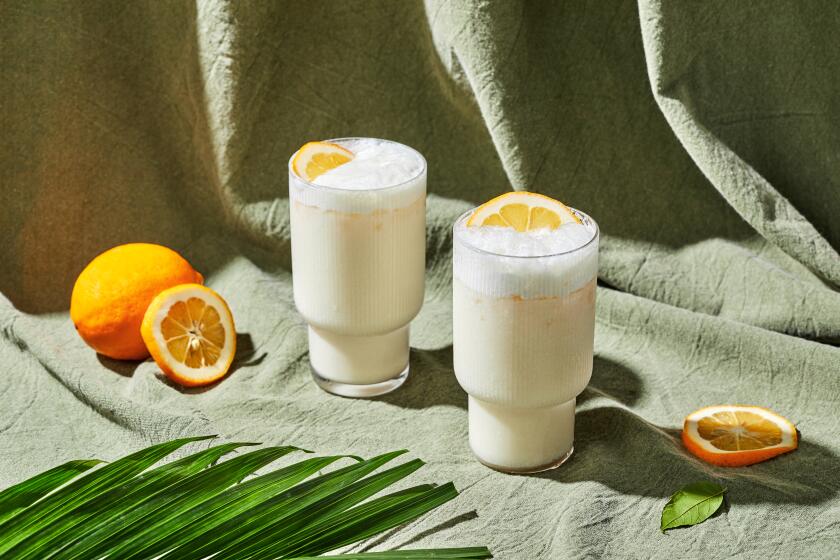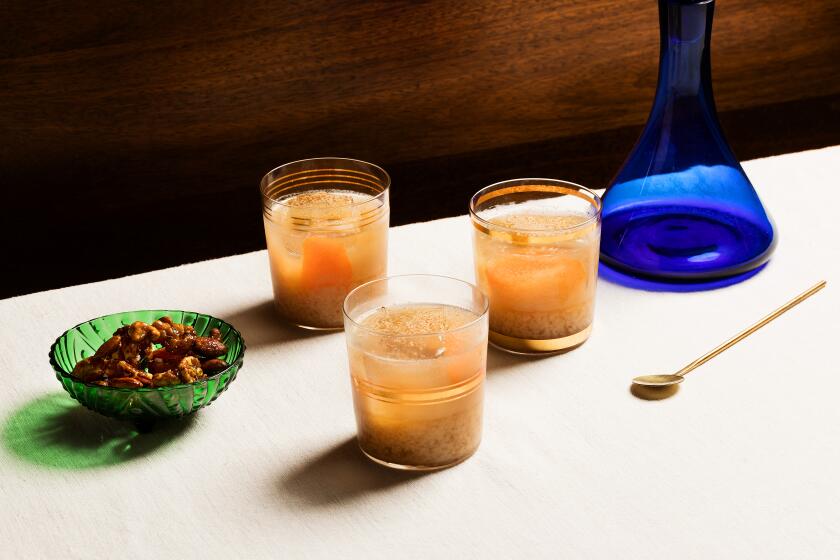Aunt Lulu's original eggnog
- Share via
My grandmother Blanche was a teenage bride. In 1907 she hopped on the back of her beau’s Indian motorcycle and rode away from her home in Pasadena--not into the sunset, but off to El Centro, where she lived in a tent with her new husband.
She was 16, and my grandfather Art was 18. He worked wherever he could while she set up housekeeping and spent lots of time sweeping sand out of the tent. She wrote to her young brothers of her adventure, asking hesitantly about their mother’s reaction to the marriage.
Before the first winter, they returned home to the foothills of Pasadena and were welcomed back by their families. A child was on the way. Eventually, around the corner from the chicken ranch where he’d been born, Art bought a house for Blanche. He hauled river rock up from the Arroyo Seco and used it to build her a huge fireplace.
In this neighborhood where they raised four children, they were surrounded by extended families on both sides. This created the question of where to go for the holidays. They spent Thanksgiving with my grandfather’s family, but for Christmas, my grandmother invited her folks to her house for breakfast.
As my grandmother’s four kids grew and the older generation passed on, the breakfast began to include close friends and acquaintances. During World War II this family breakfast became a true open house. Anyone who wanted to come could, and everyone who did was fed. All of the ration cards for coffee, sugar, butter and bacon were pooled (there were plenty of eggs because there were plenty of chickens). And so it began: The Christmas Breakfast.
After the war, my dad came out of the service knowing how to cook for an army. This came in handy as he and my mom moved into my grandparents’ house and their family grew to five children.
Naturally, he began cooking The Christmas Breakfast. My mom loved working in the front of the house as much as my dad loved the kitchen. He was comfortable cooking for people; she liked to visit. Mom took orders for eggs, bacon, sausage, hash browns and toast, and he’d cook them.
There wasn’t time for any fancy stuff in the Army and not at Christmas, either. Dad was a short-order kind of cook, with lots of tricks. People loved his fried eggs because he cooked them in butter, always being careful to ladle a spoonful of hot bacon grease right in the center of the yolk to cook it through. He cooked bacon in huge batches, always slightly underdone. Then he’d store it in a Crock Pot to keep warm and cook through. For folks who liked their bacon crisp, he always had a stash on a baking sheet in the oven.
Despite occasional strains and shifts between my grandparents and parents, unspoken payoffs and resentments, The Christmas Breakfast went on. There were legendary stories of breakfasts past, like the time Aunt Kate fell down the cellar steps. A large gal, she was OK, but it took almost every man at the breakfast to hoist her up.
Then there was the year that someone let the emotionally disturbed, stuttering parrot, Sir Chester Drawers out of his cage. He flew to the top of a neighbor’s pine tree and promptly fell out, knocked out cold. He might have survived the fall, but my grandmother helpfully gave him a shot of brandy to bring him around. He shuddered, flapped his wings and was no more.
Our childhood memories of the breakfast have more to do with being enlisted to help put on a party that we were actually a little ambivalent about, since it came immediately after the opening of the presents. If the front door had had a lock, we might have used it to keep folks out for a while so we could linger a little longer with our gifts by the fire.
“You kids get those presents upstairs!” our mother would shout, prompting lots of eye-rolling from us. After that was done, we’d be sent across the street to our relatives, grumbling all the way, to borrow picnic tables that would be stretched across the living room and covered with starched linen tablecloths, salt and pepper shakers and plates of butter.
Some years were meager. My father’s work history was not as consistent as his cooking. The guests generously brought gifts of food: ham, fresh and dried fruit, sweet rolls, preserves, fruitcake and pies. A special present would be a big slab of unsliced bacon. And they usually left feeling full.
At some point, an uncle took over making the eggnog, pouring quarts of store-bought eggnog, half a gallon of eggnog ice cream and quantities of Bourbon, brandy and rum into a large punch bowl. He usually made two or three really stiff batches, and the kids would watch as some of the adults were transformed. The sullen became happy, patting our heads, the shy suddenly asking us in a loud voice what grade we were in and what was the name of our teacher, or a reserved uncle turned red-cheeked and suddenly demonstrative. We were relieved to escape to our father’s sanctuary, the kitchen, to wash, dry or put away dishes. There were always lots of dishes.
After my mother went back to college and began teaching, she expanded the circle of people that came to the breakfast. She would bring her classmates and some of her professors. When she started teaching, she brought other teachers and several students, and sometimes they would bring their parents, all making a visit to the little kitchen to say hello to my father. He’d be singing and joking with his kids and cooking. People seemed to gravitate to that.Folks began to bring fancy arrangements of fruit, pounds of See’s candy, bottles of wine, bags of fancy coffee and seasonal dish towels, always needed. My father had started baking: date-nut, persimmon and banana breads, fruitcake and, always, my grandmother’s Wesson Oil coffeecake.
The crowd of family and friends eventually grew to about 150 people. Art and Blanche had passed on, but The Christmas Breakfast was cooked in the same old kitchen in which it had always been cooked. The toast that was once cooked under the broiler was made in the new eight-piece toaster. The coffee was made in a huge electric coffee pot, and there was the Crock Pot. My dad would just keep plugging in appliances until a fuse blew, then the tension would mount and his kids would joke, “He’s gonna blow!” He’d regain his humor, the fuse would be replaced and life continued.
My parents relaxed into a comfortable routine of putting on the breakfast, with only momentary tensions. Some years my dad would decide to paint the kitchen the day before Christmas, or my mom would get up to iron the tablecloths at 6 on Christmas morning. They could do that; the house belonged to them.
When my mother was diagnosed with Alzheimer’s disease, my dad decided to sell the house and move. The last breakfast was on Christmas 1988. Lots of people came to honor and remember a past that would soon be lost to my mom forever. But her kids remember still, and at Christmas we gather their progeny together, we cook their recipes, we tell their stories and we laugh. They wouldn’t want it any other way.
Beat the yolks just to break them up. Add the sugar, a little at a time, beating until the mixture becomes lemon-colored, 5 minutes. Stir in the Bourbon.
Fold the cream and milk into the yolk mixture, then sprinkle the nutmeg on top.
Place the eggnog in a punch bowl and set the bowl in a larger bowl of ice to keep cold.
Get our Cooking newsletter
Get a taste of Los Angeles — and the world — with recipes and kitchen tricks from the L.A. Times’ Cooking newsletter.
You may occasionally receive promotional content from the Los Angeles Times.










